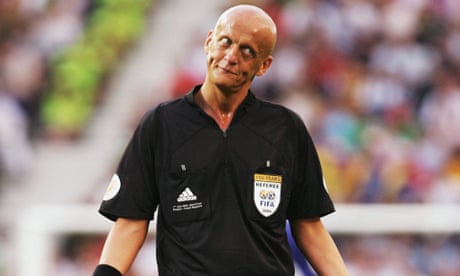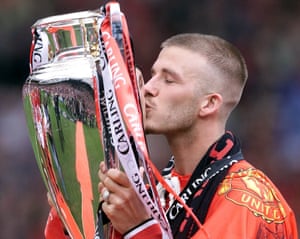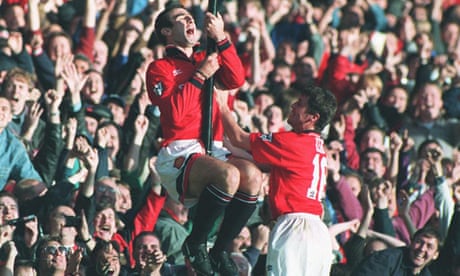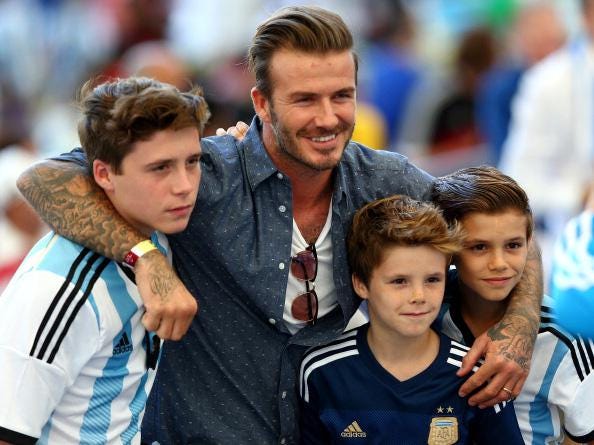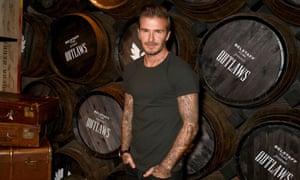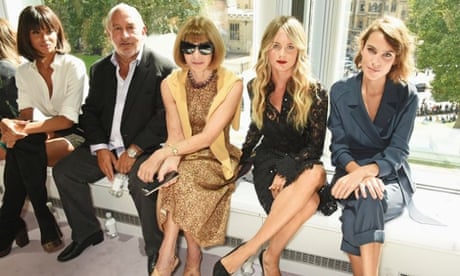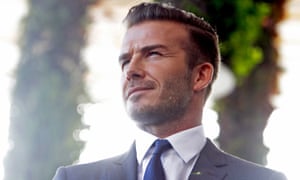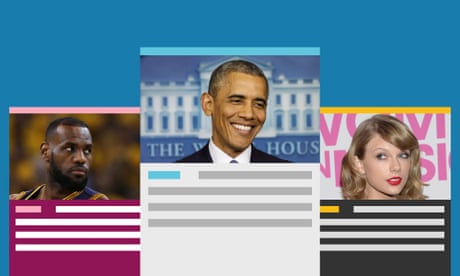Joins Manchester United
David Beckham was born in Leytonstone, London, on May 2, 1975 to Ted, a repair man, and Sandra Beckham. He started dreaming about playing soccer professionally when he was eight years old as he watched the sport on television. Beckham played youth soccer, and when he was eleven he won the Bobby Charlton Soccer Skills Competition, which judged ball control skills. The win earned Beckham a trip to Barcelona, where he drew the attention of a Manchester United soccer talent scout. His parents insisted that Beckham finish his schooling at Chingford High before he could join a professional team.At the age of sixteen, Beckham signed on as an apprentice for Manchester United and the team won the Football Association (FA) Youth Cup in 1992. On April 2, 1995, Beckham made his Premier League debut at home in a match against Leeds United. During the following season, 1995-96, he began making an impact on his team from the midfield position. He was slowly growing a reputation for his ability to execute free kicks and score goals, often times in sensational fashion or at critical moments of the game. His performance during the season caught the attention of England's national team manager, who capped Beckham (named him to the national team). He made his national debut on September 1, 1996, against Moldova.
Manchester United won the Premier League championship both in 1996 and 1997. In 1997 Beckham was
voted the Young Player of the Year and finished second in voting for the overall Player of the Year award. Despite failing to retain the Premiere League title in 1998, Beckham was named to England's World Cup squad, and he signed a five-year, $12.5 million contract with Manchester United.
1998 World Cup Fiasco
Beckham's 1998 World Cup experience became a turning point in his career. In the match against Columbia Beckham scored a spectacular game-winning free kick. However, he went from national hero to national villain in a heartbeat when, in the next match against Argentina, he was given a red card (which means expulsion from the game) for kicking Argentina's Diego Simeone just minutes into the second half with the score tied 2-2. Argentina went on to win on penalty kicks, eliminating England in the second round. Simeone had flattened Beckham from behind and, in response, Beckham flung his leg out, grazing Simeone who fell dramatically hard. Simeone's infraction merited a yellow card (a warning), but Beckham, given the first red card of his career, was booted from the match.In the aftermath of England's loss, Beckham was vilified. The Daily Mirror's headline read "10 Heroic Lions, One Stupid Boy," and the Daily Star's banner read "What an Idiot." Beckham was hung in effigy outside a London pub, and a Baptist church message board read "God Forgives Even David Beckham." He received death threats and was continually booed the following season each time he touched the ball. Beckham was not immune to the constant criticism, and publicly apologized, saying, according to Sports Illustrated, "I will always regret my actions. I want every fan to know how deeply sorry I am."
Celebrity Status
Beckham, known as Beck by his fans, was quickly becoming more than a soccer player; he was a national celebrity. He is also the pretty boy, the national and international heart throb, and as much was written about his hairstyle and his choice of clothes as his soccer abilities. When Beckham began dating Victoria Adams, also known as Posh Spice from the pop group Spice Girls, in 1997, he and Adams became daily fodder for the tabloid press. Much of the media's attention was initially encouraged by the couple, who tossed tidbits of personal information to the tabloids and could be seen out and about wearing matching designer outfits. In 1998 the couple announced that Adams was pregnant, which once again added fuel to the media fire. Tabloid reporting intermixed true stories with false to further hype the couple. Much like Princess Diana before them, Beckham and Adams are reviled in the press as much as they are praised. Yet the more the press deems them uninteresting, tac! ky, and glamour hounds, the more obsessed England becomes in following their every move.The media was in a frenzy in July 1999 when Beckham and Adams married in Luttrellstown Castle, eight miles west of Dublin. The daylong gala reportedly cost $800,000. Adams wore a diamond-encrusted crown, and Beckham wore an ivory suit. After the nuptials, the newlyweds sat in gilded, red-velvet thrones, with their young son Brooklyn between them, watching their guests mingle under live potted apple trees and fluttering doves. The night, which the National Post noted would be long remembered "for its monumental tackiness," included an 18-piece orchestra playing old Spice Girl tunes, footmen, fireworks, and a cake topped with an edible, nearly nude figure of Beckham and Adams embracing. Beckham and Adams appeared at the end of the affair in matching purple outfits. The couple sold the pictures of their wedding to OK! magazine for $2.2 million.
On-field Redemption
Beckham started the 1998-99 soccer season on a mission to redeem himself for his grave error at the World Cup. Despite playing under constant pressure and ongoing booing from the crowd, Beckham had an excellent year and lead Manchester United to an unprecedented triple crown, winning the Premier League championship, the FA Cup, and the European Cup. Beckham had another good year during the 1999-2000 season, winning his fourth Premier League championship. He was runner-up in the voting for both best player in Europe and the best player in the world, and was second in voting for the BBC Sports Personality of the Year (which was won by Lennox Lewis ). Although he scored his fiftieth goal during the season, more press was given to his new mohawk haircut.Beckham's play on the soccer field went a long way to redeem his image after the World Cup fiasco. Despite a slump early in 2001 that had critics grumbling about his true value, Beckham remained focused and returned to form. By the end of the 2000-01 season, having been named the team's captain, he was receiving high praise for his new-found leadership, maturity, and wisdom. Often knocked as a footballer with exceptional skills that did not necessarily come through in the clutch, Beckham quieted his critics by proving himself on the field.



